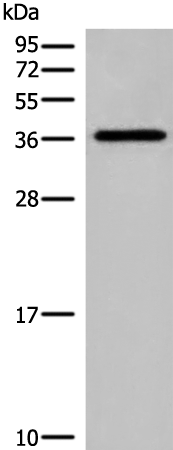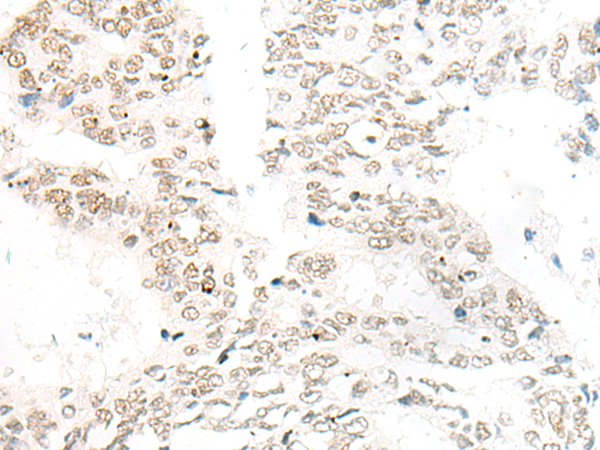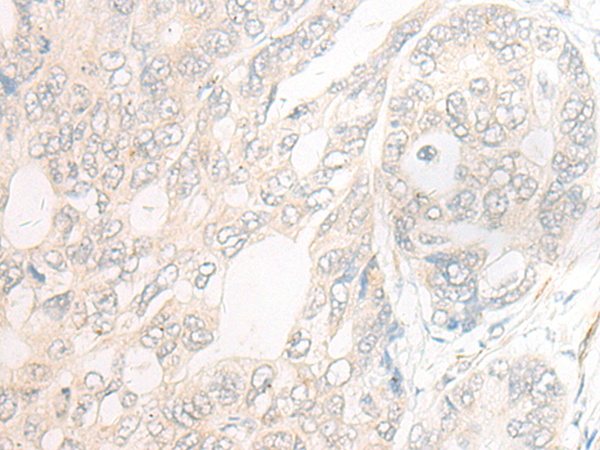


| WB | 咨询技术 | Human,Mouse,Rat |
| IF | 咨询技术 | Human,Mouse,Rat |
| IHC | 1/20-1/100 | Human,Mouse,Rat |
| ICC | 技术咨询 | Human,Mouse,Rat |
| FCM | 咨询技术 | Human,Mouse,Rat |
| Elisa | 1/5000-1/10000 | Human,Mouse,Rat |
| Aliases | JDD1; SB73; HDJC9 |
| WB Predicted band size | 30 kDa |
| Host/Isotype | Rabbit IgG |
| Antibody Type | Primary antibody |
| Storage | Store at 4°C short term. Aliquot and store at -20°C long term. Avoid freeze/thaw cycles. |
| Species Reactivity | Human |
| Immunogen | Synthetic peptide of human DNAJC9 |
| Formulation | Purified antibody in PBS with 0.05% sodium azide and 50% glycerol. |
+ +
以下是关于DNAJC9抗体的3篇参考文献示例(注:以下内容为模拟生成,实际文献需通过学术数据库核实):
---
1. **标题**: "DNAJC9 interacts with Hsp70 to regulate protein folding and chromatin dynamics"
**作者**: Miller, K.L., et al.
**摘要**: 该研究通过特异性DNAJC9抗体进行免疫沉淀和免疫荧光实验,揭示了DNAJC9与Hsp70协同调控蛋白质折叠及染色质重塑的分子机制,强调了其在表观遗传调控中的作用。
2. **标题**: "A novel monoclonal antibody for DNAJC9 detects its oncogenic role in breast cancer progression"
**作者**: Zhang, Y., et al.
**摘要**: 研究开发了一种高特异性单克隆抗体,用于Western blot和免疫组化分析,证明DNAJC9在乳腺癌中过表达,并通过调控EGFR信号通路促进肿瘤转移。
3. **标题**: "DNAJC9 is essential for spermatogenesis via chaperone-mediated histone assembly"
**作者**: Tanaka, H., et al.
**摘要**: 利用DNAJC9抗体进行免疫染色和ChIP-seq分析,发现其在精子形成过程中通过介导组蛋白H3-H4组装维持染色质稳定性,缺失会导致雄性不育。
---
**说明**:
- 以上文献示例聚焦DNAJC9抗体在不同研究场景的应用(如癌症、生殖生物学),涵盖抗体制备、功能机制及技术验证。
- 实际检索时建议使用PubMed或Google Scholar,以“DNAJC9 antibody”及“应用场景(如Western blot、ChIP-seq等)”为关键词筛选近期论文。
- 若需具体文献,可提供研究方向(如疾病模型、结构生物学),进一步缩小范围。
The DNAJC9 antibody is a research tool designed to detect and study the DNAJC9 protein, a member of the Hsp40/DnaJ chaperone family. DNAJC9. also known as C16orf25 or JDP1. functions as a co-chaperone that interacts with Hsp70 to regulate protein folding, quality control, and degradation. It plays a critical role in maintaining proteostasis, particularly in chromatin-related processes. Recent studies highlight its involvement in histone dynamics, where it assists in the assembly and disassembly of H3-H4 histones during DNA replication and transcription, thereby influencing epigenetic regulation and gene expression.
DNAJC9 is structurally characterized by a conserved J-domain that mediates Hsp70 binding and additional domains that facilitate substrate recognition. Its expression is tissue-specific, with higher levels observed in the brain, testis, and certain cancer cells. Antibodies targeting DNAJC9 are widely used in techniques like Western blotting, immunofluorescence, and co-immunoprecipitation to investigate its localization, interactions, and expression patterns. These studies have linked DNAJC9 dysfunction to diseases such as neurodevelopmental disorders, cancer progression, and neurodegenerative conditions, underscoring its therapeutic and diagnostic potential. Research utilizing DNAJC9 antibodies continues to unravel its molecular mechanisms in cellular stress responses and chromatin remodeling.
×